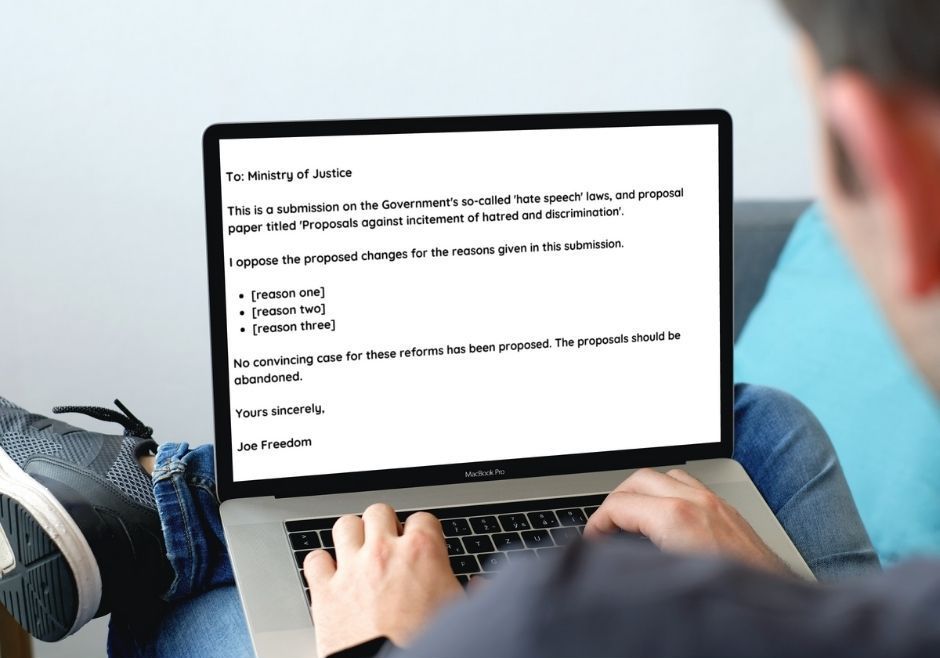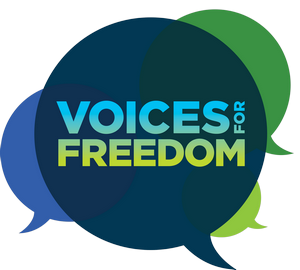Get Started!
INSTRUCTIONS – HOW TO USE THIS TEMPLATE:
-
Copy and paste the template email into your own email (to email) or Word document (if sending by mail – allow time for post). Click here to download the template as a Word document.
-
Choose 3+ points from the bullet points below and add them to your draft email or Word document. It’s important to use your own selection so that your feedback is unique to you.
-
Add any other points you wish.
-
SEND BY EMAIL TO: [email protected]
-
OR SEND BY POST TO:
Safer Online Services & Media Platforms Consultation
Dept. of Internal Affairs
PO Box 805
Wellington 6140

Your Email Template:
To: Department of Internal Affairs
This is feedback on the Government’s proposal paper titled ‘Safer Online Services and Media Platforms Discussion Document’.
I oppose the proposals for the reasons given in this feedback.
-
[reason one]
-
[reason two]
-
[reason three]
No convincing case for these reforms has been proposed. The proposals should be abandoned.
Yours sincerely,
[your name]
Bullet Points to Choose From:
Censorship is not the answer to speech we do not agree with:
- Censorship is not the answer to speech we do not agree with. On the contrary, an open online media enables robust discussion. This is the hallmark of a free society.
- Efforts to censor online content are destined to fail. Codes of practice are unlikely to successfully diminish an unquantifiable “harm”. On the other hand what will be achieved is a restriction in public discourse, and the suppression of valid speech and the right to hold a differing view.
- Section 14 of the New Zealand Bill of Rights Act 1990 protects freedom of expression. This includes the freedom to seek, receive and impart information and opinions of any kind, in any form. A robust interpretation must apply to this fundamental freedom.
- Rather than censor what New Zealanders say, we would do better to encourage more healthy debate on confronting issues. Banning speech doesn’t eradicate it. It drives it underground. While we may temporarily run the risk of offence, the best solution to bigoted ideas is to discuss why they are undesirable.
- The best solution to new concepts that worry people is talking about them and working out how we want to manage them together. In this way, New Zealanders will not only become more resilient, but they’ll also become more empathetic, wiser and retain their precious freedoms.
The Codes Are A Loophole To Bringing In Hate Speech Legislation:
- The proposed codes are a Trojan horse. Ostensibly being introduced to help “protect” Kiwis from an ill defined and subjectively assessed “harm” (such as the nebulous “interference in a democratic process”) the codes will inevitably be used to stifle free speech.
- The new Regulator will have the power to determine both the content of a code and to assess a platform’s compliance with this same code, to determine what qualifies as “harmful” or “unsafe” content.
- The proposed legislation will provide a loophole for the Government to bring in its controversial “hate speech laws” (and more) whilst being the ultimate arbiter of what constitutes misinformation or disinformation.
- What is proposed is the establishment of infrastructure with soft definitions to target ‘unsafe’ and ‘harmful’, which will inevitably be expanded, updated, amended and revised. We only need to look towards what has been proposed or adopted in Ireland, Australia and Canada to see examples of this.
What Constitutes “Harmful Content” Or “Unsafe Content” Is Subjective:
- The test of what constitutes “harmful content” or “unsafe content” is a subjective one. New Zealanders will be in a position of not knowing which content will be deemed harmful or unsafe.
- There will be a clear chilling effect on society as platforms are forced to ensure people bite their tongues online for fear of breaching ambiguous provisions, the scope of permissible speech narrows. This is undoubtedly an egregious result in a democratic and free society.
- There will always be bigots who say things others find offensive. There will also be people holding strong beliefs others find offensive. We may consider particular statements and opinions upsetting or even repulsive, but our feelings don’t warrant these beliefs being made illegal.
- There is no defence of “truth”. The implications for this are alarming: if content is true, its sharing could potentially still lead to criminal prosecution.
An Unaccountable Regulatory Body Is Not Democratic:
- An unaccountable regulatory body is not democratic.
- The proposed online censorship laws will put immense power in the hands of Regulatory body that has no accountability to Parliament and therefore none to the New Zealand public. The Regulator will be entitled to specify which code applies to which platform, and will be empowered to target those platforms it chooses to.
Participation in a particular group should not afford individuals with special rights:
- Participation in a particular group should not afford individuals with special rights, nor remove the ability of others to hold opinions, whatever they may be, about that group. Who deems which groups get special protection? Who decides what is and isn’t an acceptable view? These seem to be considerations best addressed by public discussion, not by laws imposing hefty penalties.
- Race has no place in determining what speech should or should not be allowed. Under the proposed censorship laws the Regulator will be responsible for ensuring appropriate processes are built into the code development and approval process to guarantee Maori participation and to ensure the codes reflect Maori social and cultural values.
- Co-governance requirements will lead to division, conflict, uncertainty and most of all lack of fairness.
- The discussion document mandates co-governance on the one hand whilst citing racism as a harm of significant concern on the other hand.
- The Regulator will be responsible for making sure appropriate processes are built into the code development and approval process to “ensure Maori participation” and to “ensure the codes reflect Maori social and cultural values”.
The Dominant Industry Players Will Dictate The Censorship Code:
- The dominant industry players will dictate the (censorship) codes.
- The Regulator will have power to endorse specific industry groups to develop codes on behalf of their member platforms, and power to take over leadership of code development should an industry group fail to make progress on an acceptable code.
- It is inevitable that within each sector, the industry groups involved in the code development process will be the biggest and most influential. This is particularly the case in news media where a high risk of regulatory capture arises as these established players shape the rules for their competitors, suppressing and marginalising smaller and emerging platforms.
An Unfair Compliance Burden On Smaller New Zealand Media Outlets:
- The online censorship laws as proposed will create significant monitoring and reporting obligations leading to substantial compliance costs on platforms.
- Only the bigger platforms with abundant resources will be able to afford compliance. In addition, enforcing compliance against international platforms will be challenging, resulting in New Zealand-based platforms bearing the brunt of the effects.
- Compliance costs will have a chilling effect on the local industry, reducing competition and creating a barrier to entry.
- Non-compliance or a breach of the codes is at the identification and behest of the Regulator and will result in extraordinary monetary penalties that will likely make operative longevity impossible.
